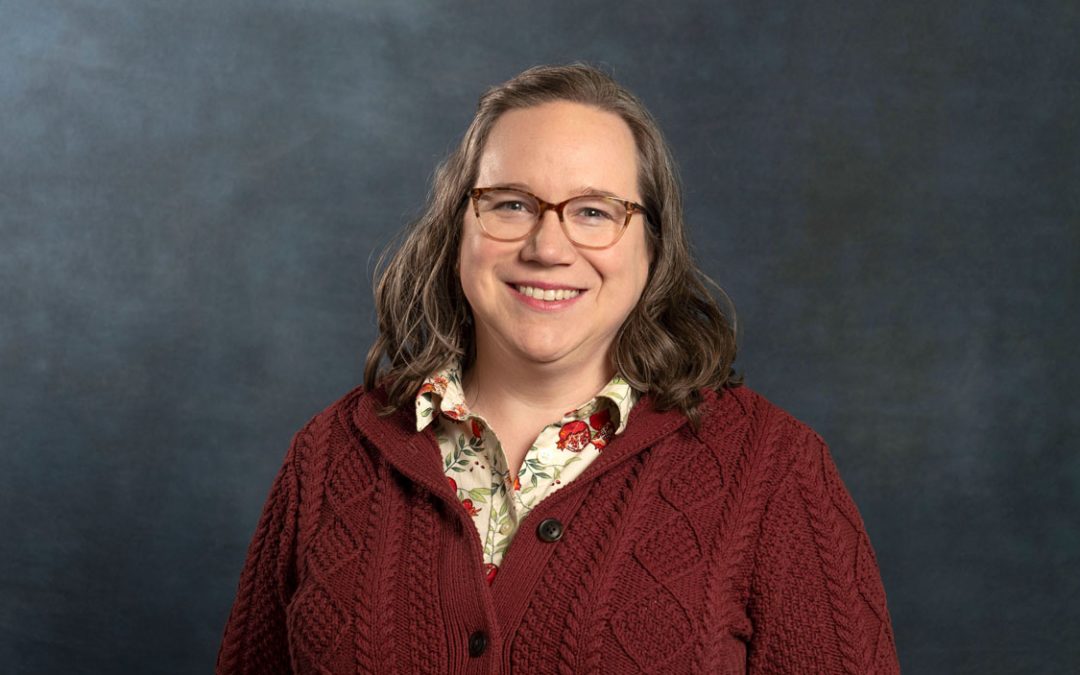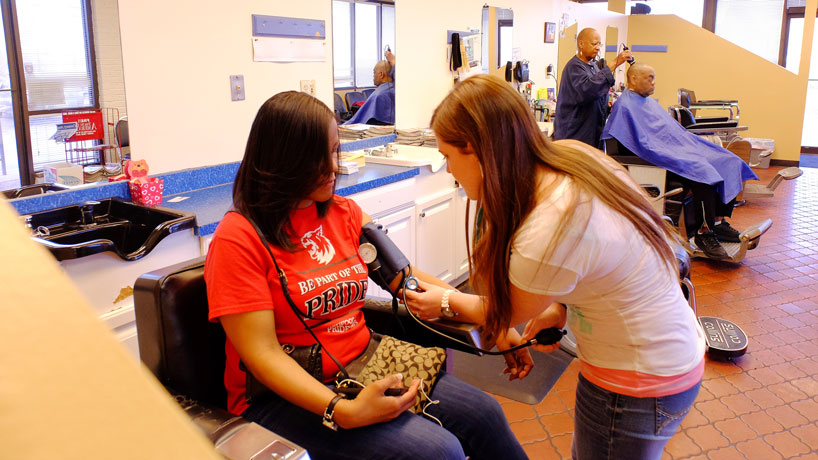
Senior nursing student Amy Linck checks the blood pressure of a Womack’s Barber and Beauty Style regular in Jennings, Mo. (Photos by August Jennewein)
It’s still early Saturday morning and the ladies of Womack’s Barber and Beauty Style are already greeting customers with smiles, washing hair, and starting twists and braids on their first few appointments.
But hairstyling isn’t all that’s offered at Womack’s this morning.
“What’s your normal blood pressure?” asks University of Missouri–St. Louis nursing student Amy Linck of a barbershop customer who has opted for a free health screening while she waits.
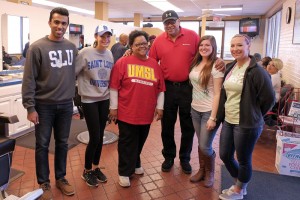
(From left) SLU students Suraj Arshanapally and Angela Dicosola, UMSL Community Health Nursing Assistant Professor Sheila Grigsby, 100 Black Men Health & Wellness Division Leader Lennie Harrison, and UMSL students Amy Linck and Tamara Bennett lead a weekend’s efforts for the Barbershop Tour at Womack’s.
On this day, Linck and fellow UMSL nursing student Tamara Bennett screen willing patients in a private nook at the back of the shop, while Saint Louis University public health students Suraj Arshanapally and Angela Dicosola conduct health surveys.
“My blood pressure runs high when I’m without my medication,” says the patient, who admits it’s been awhile since she’s had her blood pressure checked. “I already took my meds, so it should be good.”
Bringing health screenings into local barbershops on the weekend started back in 2009 with the collaboration of the local community nonprofit 100 Black Men of Metropolitan St. Louis and the School of Nursing at SLU. 100 Black Men bolsters youth with positive role models and experiences. They focus on mentoring, education, health and wellness, and economic development.
They named the health project the “Barbershop Tour,” which turned into an annual event and is in its seventh year. For Sheila Grigsby, assistant professor in the College of Nursing at UMSL, the effort fits hand in hand with her focus on community health nursing. For four years now, she’s had students participate in the tour.
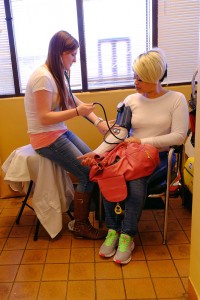
Amy Linck checks a waiting barbershop customer’s blood pressure. Linck plans to go into obstetrics and gynecology after she graduates this spring.
“The barbershops help introduce students to the people they serve in a different way,” Grigsby says. “It gives them intimate access and is a really good way for them to experience and learn about community health.”
Keon Gilbert, assistant professor in the College of Public Health at SLU, agrees.
“It’s a great opportunity for students to engage the community through service learning,” says Gilbert, who has had students participate the past three years.
100 Black Men, UMSL and SLU collaborate with several barbershops across the St. Louis region, providing easier access to basic healthcare.
“If you go to a free health clinic in a low-income area, you might have to wait three hours just to have your blood pressure checked,” says Lennie Harrison, the health and wellness division leader for 100 Black Men, who is checking up on the tour this morning at Womack’s. “Here, you can be seen in the 15 minutes either before or after your hair gets done.”
His point is immediately underscored when a barbershop customer walks up for a screening and teases, “No waiting? No line?”
But Harrison also stresses the more consequential benefits of the tour as well.
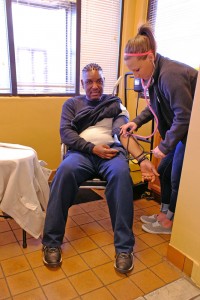
Tamara Bennett checks the blood pressure of a man after having his hair done. Likewise, Bennett also plans to go into obstetrics and gynecology after she graduates this spring.
“What we’re doing is educating people on diet, high blood pressure and trying to save lives,” he says.
With 79 UMSL nursing students and 36 SLU public health students, more than 100 students total are helping with the Barbershop Tour this year. Grigsby says that on average the students conduct about 10 screenings per shop each week, and she estimates that almost 500 people will have been screened by end of the tour.
This Saturday, April 9, is the last weekend of the tour.
“It’s been a great experience,” says Linck, who is participating for the first time. “Almost every person is willing to be screened, and I’ve gotten to practice what I learned in class. I’ve been talking about diets a lot, practicing taking blood pressure and educating people about the effects of caffeine and cigarettes on their screening results.”
All four students at Womack’s this morning plan on going into the health field with varying focuses from obstetrics and gynecology to general family practice to public health statistics. More than anything, Grigsby and Gilbert are happy to see their students investing their skills in the community.
“It’s about service and giving back,” Grigsby says. “What better way to do that than through promoting health?”













